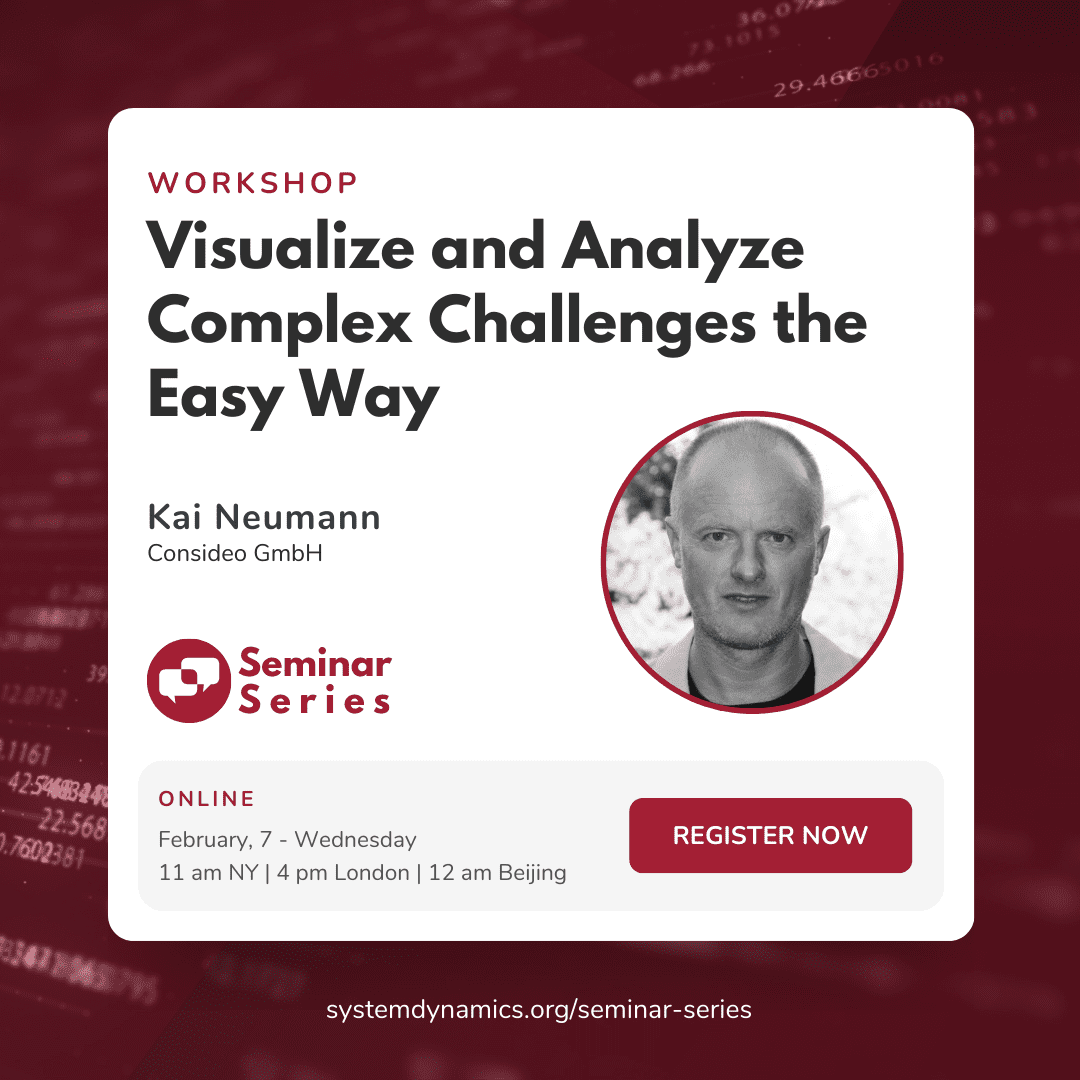From Text to Map: A System Dynamics Bot for Constructing Causal Loop Diagrams
May, 15 at 11 am NY | 4 pm London | 11 pm Beijing | Time Converter
From Text to Map: A System Dynamics Bot for Constructing Causal Loop Diagrams
Join us to delve into the innovative System Dynamics Bot, a tool designed to automate causal loop diagram creation from text. Learn how it performs in converting text to maps, see practical examples, and understand the challenges and solutions in its development.
Learning Outcomes:
- Gain insight into the capabilities of large language models in system dynamics and model building.
- Understand the effectiveness of the System Dynamics Bot in identifying key relationships within textual data.
- Discover the challenges encountered and solutions implemented during the development of this tool.
This webinar is ideal for system dynamics practitioners, data analysts, and anyone interested in the intersection of artificial intelligence and model building. Sign up to explore how this technology can streamline your modeling processes and enhance your understanding of complex systems.
About the Presenters
Niyousha Hosseinichimeh has a PhD and a master’s degree in public administration and policy from State University of New York at Albany, and a bachelor’s degree in mechanical engineering from Sharif University, Iran. She is currently an assistant professor at the Department of Industrial and Systems Engineering at Virginia Tech. Her research focuses on developing and applying methods to improve health and healthcare systems. She uses simulation models to help stakeholders improve their understanding and decision making in complex dynamic systems. She has applied system dynamics approach to diverse health issues including infant mortality, mental health, and alcohol impaired driving among teens. Her methodological contributions include expanding calibration methods for dynamic models and developing techniques for system dynamics group model building. Her research has been funded by the National Institute of Health, National Science Foundation, Agency for Healthcare Research and Quality, Ohio State Department of Health, and Burroughs Wellcome Fund.
Dynamic Business Models for Strategic Management Accounting
Feb, 28 at 11 am NY | 4 pm London | 12 am Beijing | Time Converter
This seminar is part of our special series System Dynamics for Business Innovation with Kim Warren. A series of nine webinars offering a deep dive into the application of System dynamics in Business. The sessions will explore strategic modeling techniques and their transformative impact across different business domains, from strategic management to IT systems planning and environmental impact. This series will reveal the potential of System Dynamics as a powerful tool for business innovation and complex decision-making.
Session 2
Dynamic Business Models for Strategic Management Accounting
Overview
This session explains the aims of strategic management accounting (SMA) – giving senior leaders insight about how a business develops and performs, beyond just the financials – and the challenges faced by those trying to do so. This seminar will explain that strategic management covers many more responsibilities than simply building the business plan. It will show that Dynamic Business Models can very largely fulfill those needs, in an efficient, reliable and transparent manner. DBMs provide exactly the joined-up view of a business and financials that leaders say they want. (The session is supported by two substantial practitioner articles)
Learning Outcomes
- Understand the aims of strategic management accounting.
- See how DBMs transform the contribution that SMA can offer.
- Learn to integrate dynamic modeling of a business system’s behaviour with the financial outcomes it generates.
Target Audience
- Accountants seeking to upgrade their contribution to organizations’ strategic performance.
- Business strategists and consultants needing to demonstrate both strong business development and financial performance.
- Academic professionals and students in business, accounting, and finance.
- Business professionals wanting to integrate their strategic management efforts and financial outcomes.
This session is designed to provide practical skills and theoretical knowledge, making it valuable for professionals aiming to leverage dynamic modeling in strategic management accounting.
Certificate of Attendance
About the Presenter
Kim Warren is an accomplished strategist with a wealth of experience in the business world. He spent 10 years in senior strategy roles, including as Retail Strategy Director at Whitbread PLC. Warren then transitioned to academia, teaching Strategic Management at London Business School for two decades. During his tenure, he developed a keen interest in System Dynamics, finding traditional strategy tools insufficient for modern business challenges. This led him to embrace and adapt System Dynamics, creating the Strategy Dynamics method. Warren’s method focuses on designing and managing business systems dynamically to adapt to changing markets and internal business conditions. He has authored influential books on the subject, including “Competitive Strategy Dynamics” and “Strategic Management Dynamics,” and has been recognized with the prestigious Jay Wright Forrester Award from the International System Dynamics Society, where he also served as president in 2013. Warren, along with his partner Christina Spencer, has developed a range of learning materials and courses to disseminate the Strategy Dynamics method, utilizing the Silico online modeling app to support this approach.
For more detailed information, you can visit his website here.
Up Next
How Did En-ROADS Get 755,000 users? Lessons on Modeling, Interface Design, and Facilitation
May, 8 at 11 am NY | 4 pm London | 11 pm Beijing | Time Converter
How Did En-ROADS Get 755,000 Users? Lessons on Modeling, Interface Design, and Facilitation
In this participatory webinar, Drew Jones of Climate Interactive will share insights on how to create a System Dynamics model and online simulator that will succeed at improving mental models and system performance at scale. The teams at Climate Interactive, MIT Sloan, and Ventana Systems designed its System Dynamics models C-ROADS and En-ROADS with the goal of improving the understanding of climate policy choices amongst decision-makers around the world, leading to deliberate strategies in three major areas: 1) modeling, 2) interface/UX design, and 3) facilitation, workshop design, game creation, training, and user support. This webinar will cover the design decisions made over the ~30 years of the project, generalizing the more universal insights for any system dynamics project.
About the Presenter
Andrew (Drew) Jones is Co-Founder and Co-Director of Climate Interactive. An expert on international climate and energy issues, his quotes and data stories appear in the New York Times, The Washington Post, and other media. Jones and his team at CI and MIT Sloan developed the climate simulations used by John Kerry and others to secure the 2014 bi-lateral U.S.-China deal that set up the Paris Agreement, as well as currently in the White House and Congress. Trained in System Dynamics modeling at Dartmouth College and MIT, Jones has worked at Rocky Mountain Institute and was a protégé of Dana Meadows. Jones co-accepted the System Dynamics Society’s award for the best real-world application of modeling. He won Dartmouth College’s Ray W. Smith award for the most significant contribution to the status of the College.
Special Guests
Florian Kapmeier is Professor of Strategy at ESB Business School at Reutlingen University, Germany. He received his doctorate from the University of Stuttgart on “Interorganizational Learning in Learning Alliances”. He has strengthened his academic profile with research visits at MIT Sloan School of Management (Cambridge, USA), McGill University (Montréal, Canada), University of Lugano (Switzerland), and Emlyon Business School (Lyon, France). For his research and teaching activities, he links the System Dynamics methodology with empirical research on theory development and testing, focusing on organizational aspects of the understanding of complexity, increasingly addressing environmental sustainability issues. He works closely with the Climate Interactive to raise awareness of the consequences of climate change, using the suite of Climate Interactive’s simulation models. Florian has collaborated closely with Climate Interactive to develop the En-ROADS Climate Workshop, the Climate Action Simulation Game, and resources for the World Climate Simulation. In addition, he has helped translate both event materials and website resources for the World Climate Simulation. Florian has facilitated numerous En-ROADS and World Climate events with groups between 12-60+ people since 2014, from high-school and university students to corporate and political policy makers.
Workshop: Visualize and Analyze Complex Challenges the Easy Way
February, 7 at 11 am NY | 4 pm London | 12 am Beijing | Time Converter
Workshop: Visualize and Analyze Complex Challenges the Easy Way
Facing challenges that involve multiple interacting factors requires a methodical approach to visualize and analyze these interconnections. Qualitative modeling provides a straightforward way to map out cause-and-effect relationships. This approach is adaptable, suitable for use in workshops, collaborative models, or individual analysis.
This workshop introduces the user-friendly Consideo iModeler tool to assign weights to connections without the need for complex formulas. Utilizing the Insight Matrix, participants can easily identify key factors that either contribute to or hinder progress towards their objectives.
The session delves into the scientific principles underpinning this qualitative approach, explaining how results are derived. Additionally, it offers a comparative analysis of qualitative and quantitative models, drawing on real-world project examples. This seminar is designed to equip you with the tools to make informed decisions in complex scenarios.
About the Presenter
About Consideo iModeler
Consideo iModeler is a cutting-edge software tool designed to visualize and analyze complex situations, making it easier for users to plan, make decisions, and communicate more effectively. This software stands out for its unique Insight Matrix feature, which provides a revolutionary way to handle complexity. It allows both qualitative and quantitative modeling, including System Dynamics for scenario modeling.
Systems Thinking for Sustainability: A Proposal for International Cooperation
January, 17 at 11 am NY | 4 pm London | 12 am Beijing | Time Converter
Systems Thinking for Sustainability: A Proposal for International Cooperation.
The international cooperation proposal “System Thinking for Sustainability” is an initiative led by the Autonomous University of Bucaramanga (UNAB) whose fundamental objective is to address current challenges in favor of global sustainability. It is based on the application of Systems Thinking, a comprehensive approach that seeks to understand and solve complex problems from a holistic and interconnected perspective.
This proposal focuses on promoting sustainable development through collaboration and promoting innovative solutions. Through the analysis of complex systems and the identification of interdependent relationships, it seeks to find strategies to address contemporary dilemmas in key areas such as energy transition, organizational and institutional change for sustainability, water management, cybersecurity and the promotion of education and scientific vocations.
A look at the problems of dissemination of systems thinking: Recognizing the challenges of effectively disseminating Systems Thinking, the proposal focuses on identifying strategies to overcome dissemination barriers and promote a broader and deeper understanding of this approach, promoting its adoption and application in various areas and sectors.
An organizational proposal for coordination to improve impact: The initiative focuses on establishing an effective organizational structure that facilitates coordination between various actors interested in Systems Thinking. It seeks to enhance the impact of this approach by creating collaborative platforms, knowledge-sharing networks and strategies to promote its practical application in relevant contexts.
Development of educational tools and resources: The creation and dissemination of educational materials and practical tools that allow the understanding and effective application of Systems Thinking are sought. This includes the development of digital resources, methodological guides and training programs to encourage greater adoption and understanding of this approach.
About the Presenter





